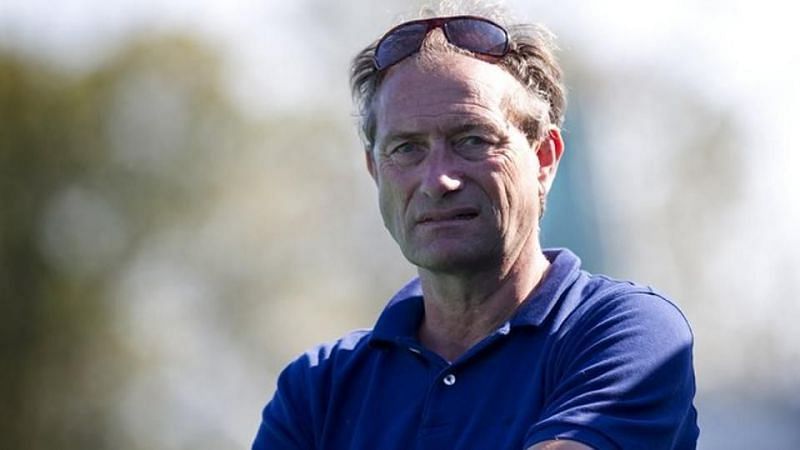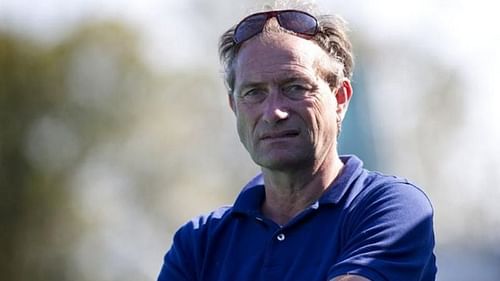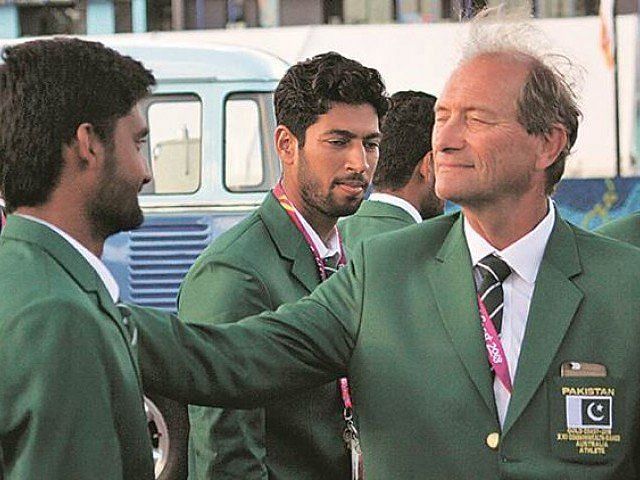
Roelant Oltmans reveals why he quit Pakistan job, feels Indian coaches need a good education system

Intriguing as it is, Roelant Oltmans' connection with subcontinental hockey goes back a long way indeed - fifteen years to be precise.
Athens to Rio and beyond - Oltmans' tryst with the Indian subcontinent
In the early 2000s, the novel phenomenon of hiring foreign coaches was beginning to gain ground in the game of hockey.
Notably, Aussie Terry Walsh was roped in by the Dutch, even as Dutchman, Roelant Oltmans travelled East in 2003, in an effort to revive the fortunes of one of the greatest hockey nations on earth - Pakistan.
The Indians too followed suit, as they welcomed German coach, Gerhard Rach to their shores barely a month before the Athens Olympics.
The litmus test for Oltmans and Rach was to get their respective sides ready for the Games. and enable them to perform better than they had at the Sydney Olympics. While the Netherlands had won gold in the 2000 Games, Pakistan had missed out on a bronze while India had ended a disappointing seventh.
Pakistan won three of their five pool matches at Athens, while the Indians managed a solo win and a draw. Both sides failed to make it to the semifinals and clashed in the classification crossovers where Oltmans' side beat the Indians by a 3-0 margin and went on to finish fifth while India stayed put in the seventh position.
All hell broke loose four years later, as India failed to qualify for the 2008 Olympics and did marginally better in 2012 by making it to London but finishing last.
None of the coaches seemed to have made any noteworthy progress with the team- Gerhard Rach had clearly failed, while Spaniard, Jose Brasa, and the great Ric Charlesworth left the country in a huff. Michael Nobbs had to call it a day owing to his deteriorating health.
Indian hockey desperately needed a saviour, but who would that be?
Enter Roelant Oltmans as high-performance director in early 2013, followed by Terry Walsh as chief coach. In 2014, India won their third Asian Games gold after a gap of 16 years under the tutelage of Walsh but he too quit and his successor Paul van Ass was shown the door soon after.
Oltmans - the man who resurrected Indian hockey?
Roelant Oltmans was appointed coach following fellow Dutchman Van Ass' departure and slowly but surely Indian hockey was witnessing a change for the better.
The Dutchman ensured that his chargers reigned supreme in Asia by guiding his side to victory in the Asian Champions Trophy in 2016.
The Indians also won the Champions Trophy silver medal the same year, as they went down fighting against a mighty Australian team in the final and ended runners-up to the Kookaburras in the Azlan Shah Cup.
To top it all, the Indians entered the quarterfinal stage of the Rio Olympics after a gap of 36 years and also broke into FIH's top six with Oltmans in charge.
Everything seemed hunky-dory, but a couple of losses to Malaysia, and an embarrassing defeat against Canada in the HWL last year halted the juggernaut to an extent following which the Dutchman was relieved of his duties.
The team's success during his tenure as coach was adjudged to be "more incidental than deliberate" by the chairman of Hockey India's selection committee but the federation also stated that they were appreciative of the legendary Dutchman's role in improving the fitness and cohesiveness of the unit.
Oltmans hit the headlines in India when it was announced that he would, once again, coach their arch rival's ahead of the Commonwealth Games and delivered a stunning blow right at the outset as Pakistan held India to a 2-2 draw at Gold Coast.
The Men in Green were beaten comprehensively by Sreejesh and co. in the Champions Trophy but fought hard against the best teams at Breda, and following his team's failure to finish on the podium in the Asian Games, the Dutchman decided to bid adieu to Pakistan, and sign up with the very team that beat India in the Asian Games semifinal at Jakarta.
A battle royale will be on the cards when Harendra Singh's boys will look to turn the tables on Malaysia and reestablish their continental supremacy in a round-robin pool match of the Asian Champions Trophy next week.
So, is Malaysia now the biggest threat to India at the Asian level - and which of his two subcontinental stints did Oltmans enjoy more?
"If you look at the world rankings, at this time, Malaysia is ranked higher than Pakistan and the same is true in Asia as well. So, that way, yes, you may say that Malaysia is the team to beat as far as India are concerned, but India has shown consistency over a period of time which Malaysia has not."
"The hospitality in both India and Pakistan is fantastic"
"I enjoy my job wherever I am because it is my job. I really enjoyed staying in both countries. The hospitality in both countries is fantastic but, of course, I was in India a lot longer than I was in Pakistan. I really enjoyed working in both countries."
In an exclusive interaction with Sportskeeda, the master tactician sheds light on why he split up with the Pakistan camp, the challenges he faced in the subcontinent, how he perceives Indian coaches, and which team he considers to be favourites for the World Cup.
Here are the excerpts of the interview:
SK: What would you say have been the biggest challenges you faced while working in the subcontinent?
Oltmans: One of the biggest challenges, of course, is to understand the culture of the place where you are going to because that culture is different in India, that culture is different in Pakistan, and I always believe that when you come to a country, you have to adapt to that culture instead of the other way around.
So, that is what I always try to do - try to understand what is really important for the group you are working with, in that specific country.
The second thing that I found difficult is that sometimes, of course, there is a language barrier as not every player in our group really understands English properly and it is also not my native language.
So, communication sometimes is difficult, but at the end, we are all talking hockey, and that is the nice part of it - bringing a bit of a different style but, at the same time, I always try to adopt a style that is in sync with the natural game of the players of that particular country.
The culture of every team is different - Malaysia is quite different to India and so is Pakistan. There are similarities of course - but, there are also differences and I try to find out what they are and to bring forth the style of play which suits that team.
"Better to leave than to not be fully passionate"
SK: What were the reasons for quitting as coach of Pakistan just two months before the World Cup?
Oltmans: It has nothing to do with the timing - it was not something that I decided overnight. During the period that I worked with Pakistan, I felt quite a number of times that it was not the right way to guide the team to the kind of success that everyone wants.

The country and the players all want the old success again but from my point of view, the facilities and the circumstances were not there to bring that to the country.
Then I had to ask two questions - does it help them if I stay on - and - does it help me if I stay on?
When the answer to both questions was no, it was clear what I needed to do. It is better, to be honest - it is better to leave than to stay there and not be fully passionate anymore.
SK: What would the aim for Malaysia be at the World Cup?
Oltmans: The aim is to first survive the pool phase, of course. I should say, it is very difficult. I think that is the most difficult pool to be in, honestly. So, we have to, at least, finish third, but Pakistan will be aiming for pretty much the same thing. Even Holland and Germany are not one-hundred percent sure that they will make it - there were a lot of upsets in the Women's World Cup.
We are focussing completely on ourselves and we will really take it one match at a time. I think it will be a fantastic tournament and I hope we can raise our world rankings by making it to the crossovers.
SK: How would you assess India's chances at the World Cup and which team do you consider to be the favourites?
Oltmans: For me, a team needs to grow into a tournament. If you look at the world rankings, India is fifth. So, can India realistically be called favourites - maybe not - but, do they do stand a chance - yes.
For a number of years now, there is one country that has won most of the tournaments - that is Australia. They failed to win the Olympics but won all the other tournaments. So, if you have to call one team as the favorites, it is most likely Australia followed by a couple of European teams. India will be the hunters.
"Former Indian players want to start coaching at the highest level"
SK: Do you feel Indian coaches are as good as Europeans in terms of devising strategies and adopting a scientific approach to coaching?
Oltmans: Of course, they (the Indian coaches) have learned a lot in the last couple of years, I am sure about it. When I arrived in India, that was not the case. In the last couple of years, quite a number of coaches have improved themselves a lot.
The most important thing that is lacking is a good education program for coaches - that does not mean that the coaches are not good, but there is no education program for coaches in the country that is really good.
One of the things I believe in is that it is very important to continue to develop the players in a proper way. What is happening at the top - that is good, but what is happening below needs improvement. Many of the former hockey players are not interested to start coaching at a lower level - they feel that they can start at the highest level right away.
As a coach, I started at 16 and used to coach boys and girls aged 8 and 9, so there is a certain pattern to it. I studied for 8 years before I started coaching at the highest level.